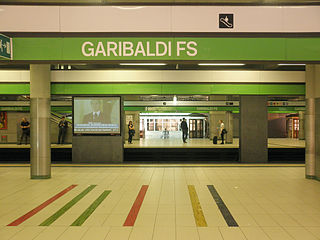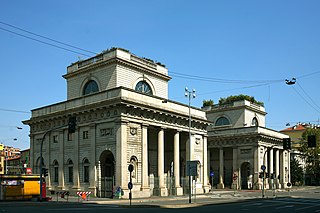
The Milan Metro is the rapid transit system serving Milan, Italy, operated by Azienda Trasporti Milanesi. The network consists of 5 lines with a total network length of 104.1 kilometres (64.7 mi), and a total of 113 stations, mostly underground. It has a daily ridership of about 1.4 million on weekdays. The Milan Metro is the largest system in Italy in terms of length, number of stations and ridership; and the seventh longest in the European Union.

Line 1 is the first underground rapid transit line built in Milan, Italy. It is part of the Milan Metro and it is operated by ATM. Works on the line began in 1957, and the first part was opened on 1 November 1964, running from Sesto Marelli to Lotto station. The line is also called Red Line, as it is visually identified by red signs. Due to its premiership, the line gave its red color to the Milan Metro logo.

Line 2, is a subway line serving Milan, Italy, operated by ATM as part of the Milan Metro. It is also called the Green Line,, as it is visually identified by green signs.

Line 3 is a subway line serving Milan, Italy. The line is part of the Milan Metro and is operated by ATM. Construction began in 1981 in order to be ready for the 1990 Football World Cup. It is also called the Yellow Line as it is identified by yellow signage.

Line 5 is an underground rapid transit line in Milan, Italy, part of the Milan Metro. The line, also known as M5 or the Lilac Line, is 12.8-kilometre (8.0 mi) long and goes through the city from the north to the north-west. It opened in stages between 2013 and 2015.

Cadorna FN is an underground interchange station in Milan, Italy, serving Lines 1 and 2 of the Milan Metro. The Line 1 station was opened on 1 November 1964 as part of the inaugural section of the Metro, between Sesto Marelli and Lotto. The Line 2 station was opened on 3 March 1978 as the southern terminus of the extension from Garibaldi FS. It served as the southern terminus of Line 2 until the extension of the line to Porta Genova on 30 October 1983.

Garibaldi FS is a station on Lines 2 and 5 of the Milan Metro, and the Milan Passante railway. The Line 2 station was opened on 21 July 1971 as part of the extension from Centrale. It served as the western terminus until 3 March 1978, when the first trains could travel the new route to Cadorna. The Passante station was opened in 1997, and the Line 5 station in 2005.

Crescenzago is a district of Milan, Italy, part of the Zone 2 administrative division, north-east of the city centre. It became part of Milan in 1923; prior to that, it was an independent borgo (town). The town is traversed by the Naviglio Martesana canal. The district houses several historical buildings, most notably a 12th Century abbey and several villas from the 18th Century. It also has notable green areas, such as part of the Lambro park, as well as industrial archeological features, most notably the abandoned Ovomaltina factory.

Porta Venezia is one of the historical gates of the city of Milan, Italy. In its present form, the gate dates back to the 19th century; nevertheless, its origins can be traced back to the medieval and even the Roman walls of the city.
Cimiano is a district (quartiere) of Milan, Italy. It is located within the Zone 3 administrative division, north-east of the city centre. The Milan Metro stops at Cimiano.

Loreto is an interchange subway station serving Lines 1 and 2 of the Milan Metro. The Line 1 station was opened on 1 November 1964 as part of the inaugural section of the Metro, between Sesto Marelli and Lotto. The Line 2 station was opened on 27 September 1969 as part of the section between Cascina Gobba and Caiazzo.

Centrale FS is a station on Lines 2 and 3 of the Milan Metro in Milan, Italy. The Line 2 station was opened on 27 April 1970 as a one-station extension from Caiazzo. On 21 July 1971, the line was extended to Garibaldi FS. The Line 3 station was opened on 1 May 1990 as part of the inaugural section of the line between Duomo and Centrale. Initially, Duomo was connected with Centrale by shuttle service, and on 16 December 1990, with the extension of the line to Porta Romana, full-scale service started. The station remained the terminus of Line 3 until 12 May 1991, when Sondrio was opened.
Milano Lambrate railway station is one of the main stations serving the city and comune of Milan, Italy.

The Milan S Lines constitute the commuter rail system serving the metropolitan area of Milan, Italy. The system comprises 12 lines serving 124 stations, for a total length of 403 km. There are 415 trains per day with a daily ridership of about 230,000.

Line 4 is an underground rapid transit line in Milan, Italy, part of the Milan Metro. The line color is blue. The first section opened on 26 November 2022 and as of 2023 it is 7.3 km long with 8 stations. The full line is expected to open by 2024. Once completed, the line will be 15 km (9.3 mi) long with 21 stations.

Porta Genova is a station on Line 2 of the Milan Metro. It was opened on 30 October 1983 as the terminus and part of the extension of the line from Cadorna. On 3 April 1985 the line was extended to Romolo.

Piola is a station of the Milan Metro, on line M2. The station grants direct access to the Politecnico di Milano (POLIMI).

Lambrate is a station on Line 2 of the Milan Metro in the Lambrate district of Milan. It was opened on 27 September 1969 as part of the inaugural section of Line 2, between Cascina Gobba and Caiazzo.

The Zone 3 of Milan, since 2016 officially Municipality 3 of Milan, is one of the 9 administrative divisions of Milan, Italy.
















